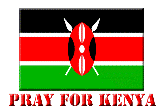The U.N. humanitarian chief warned of the prospect of escalating violence in Kenya if the African nation's post-election turmoil is not resolved soon.
"If there is no quick resolution to the political crisis, the risk of a fresh surge in violence, more displacement and further polarization of society is very high," John Holmes, the United Nation's undersecretary-general for humanitarian affairs, told the U.N. Security Council on Monday.
An environment of fear for Kenya Human Rights Chairman Maina Kiai, as he continues to receive death threats.
God Bless you Maina, you are a patriot, and you stood up to be counted.
Kofi Annan has threatened to leave if a quick agreement is not reached.
The search for a political settlement out of the post election crisis stalled after the Government side walked back several steps, changed positions on issues already agreed and threw the talks into a spin.
The Standard reliably learnt that when the talks resumed after an eventful weekend break, the Party of National Unity (PNU) made it clear it was no longer interested in sharing power. Last night, the task of making the hard choices appeared to lie with President Kibaki and bitter rival Mr Raila Odinga.
Yesterday's developments also meant that a deal may not be announced tomorrow or even later in the week as earlier anticipated and that the now increasingly perpetual state of uncertainty could still hold.
Until the dramatic twist of events yesterday, both Government and ODM had agreed in principle to create a prime minister's post and also appeared to have covered considerable ground on the sharing Cabinet positions.
But that changed at the weekend, but things went completely off tangent yesterday.
The talks also stalled after the negotiators failed to agree on whether the prime minister should have the authority to co-ordinate and supervise the execution of the functions and affairs of Government, including those of ministries and departments of the Government.
According to the Government document, the prime minister is to co-ordinate the performance of the ministries and perform any other duties as may be assigned to him by the President from time to time.
In the Legal Working Group document, any change in the Government affecting a person nominated by a parliamentary party of the coalition shall be made only after prior consultation and concurrence in writing with the leader of that party.
But yesterday, the PNU side went back on this by suggesting that the President have absolute discretion on who would be in Government.
It is a question of whether the state survives .
God help Kenya.
Tricks of the big man that could make Kenyans cry more in 2027 than they
did in 2022 After Raila...
-
Tricks of the big man that could make Kenyans cry more in 2027 than they
did in 2022 After Raila...
*https://youtu.be/Xs0SnunTu4s*
Kumekucha
6 hours ago





3 comments:
My question is what happened over the weekend to move us backwards 10 steps?
Acolyte,
Your guess is as good as mine. My view on this, is that for some people have no intention in making a commitment to these talks.
Acolyte,
These quotes may answer your question
On Monday, the PNU side came up with a totally different agenda items from what had been agreed the previous week. Progress had previously been made on the creation of the post of prime minister, who would be the leader of the party with majority MPs in Parliament and who would exercise reasonable power, including supervising ministries.
Consistency in matters agreed upon during a negotiation is not only a sign of good faith, but is the clearest testament to a desire for a speedy resolution.
The to-ing and fro-ing by PNU, which has openly exasperated the Annan team, leads many Kenyans to ask whether Mr Kibaki truly wants the best for this country - whether he cares for the thousands of displaced Kenyans languishing in refugee camps, the numerous others who paid with their lives for electoral ineptitude, whether he worries about an economy limping to a slump and if he is alive to the threat of civil war which hangs darkly over Kenya's deeply divided population.
We reject the fundamental objection of the PNU to the power-sharing proposal which had been fleshed out. We would like to state, yet again, that any new structure of government brokered by Dr Annan must be supported by a Constitutional amendment.
For one, any changes to the presidency as it exists today is itself an alteration of the Constitutional clause which created it, therefore the changes must go back to Parliament for a Constitutional amendment. They must be defined and sanctified with the same legal weight as the document it seeks to alter.
Secondly, the leaders of ODM and Mr Kibaki's side have a history of political betrayal. Surely, one can understand the insistence on a watertight agreement from a group of politicians who have yet to recover from the trashing by the President of the memorandum of Understanding they had reached in the previous election.
Relevant Links
East Africa
Conflict, Peace and Security
Human Rights
Kenya
Thirdly, these changes are strictly not just about Mr Kibaki and Mr Raila. This is a golden opportunity for Kenya as a nation to tackle, in various phases, some of the lopsided political arrangements and economic injustices widely acknowledged to have caused the crisis we find ourselves in.
http://allafrica.com/stories/200802261206.html
Post a Comment